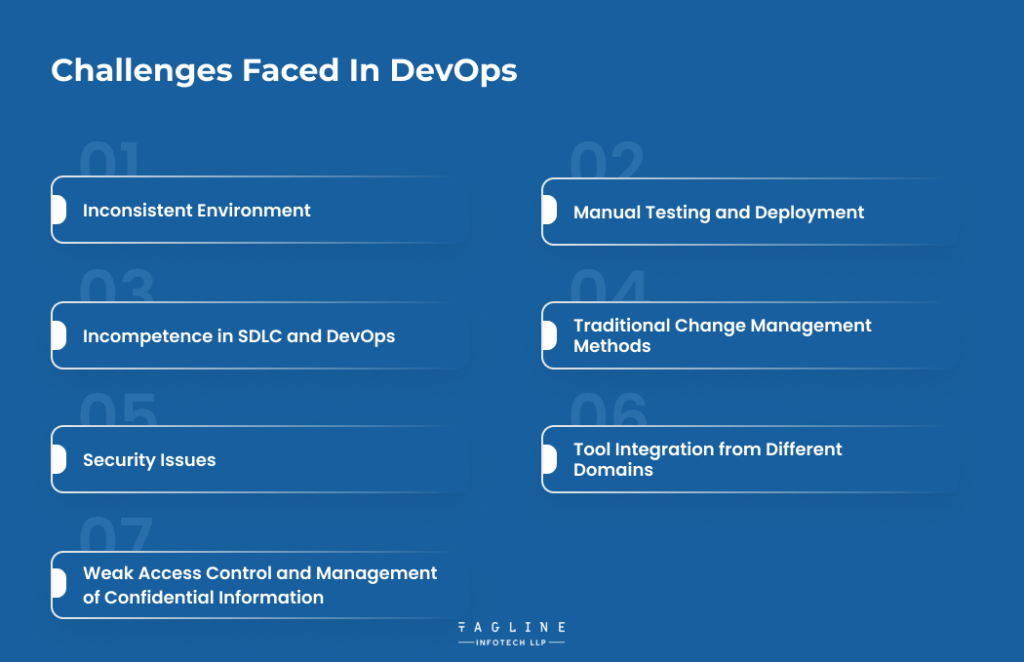A List of The 25 Best Ruby on...
May 8, 2024
Home >> DevOps >> Common Challenges Faced in DevOps

Quick Summary
Enhancing the entire software development life cycle (SDLC) workflow is the primary goal of DevOps. As a result of DevOps encompassing the whole software development culture, pipeline optimization requires consideration of the people, processes, and technology that make up the software ecosystem. DevOps faces obstacles from a range of sources, such as culture differences, poor team communication, antiquated infrastructure, and malfunctioning processes, to name a few. In addition to discussing potential solutions, this essay will cover some of the most critical problems in DevOps.
Here is the list of challenges faced in DevOps and its solutions:

Moving the codebase across teams during the software development lifecycle is a laborious operation that takes a long time because each environment utilized in the process is configured differently. This makes it very difficult for the application to function consistently in various scenarios across various platforms and wiring.
Because of this, each team member squanders time trying to solve problems without understanding that the environment—rather than the code—is the underlying problem. For this reason, one of the biggest things impeding agility and seamless transition is an uneven environment.
Solution
Establishing infrastructure blueprints and implementing Continuous Delivery (CD) are two methods we can use to ensure that every environment is the same. This will enable us to get past the DevOps-related technological challenges. The team involved should create a standard plan for the DevOps process, and continuous delivery should be implemented to ensure everyone is on the same page.
It is not advisable to engage in manual intervention throughout the testing and deployment phases of the development process when discussing it. As a result, efficiency is significantly influenced, time is utilized, and accuracy is reduced. Human error and processes that are not repeatable for the same reason result from manual involvement. An agile approach to establishing pipelines for continuous integration and delivery is not feasible when manual testing is used. Additionally, the likelihood of product defects increases with manual testing, resulting in previously unaccounted-for efforts.
The risk of failure is significantly higher when the deployment is done manually, which lowers quality and reliability while increasing unforeseen efforts.
Solution
You can address the problems related to manual testing and deployment in the DevOps environment by streamlining the entire process and strategy by automating the framework and deployment procedures. Any company that wants to use DevOps should consider integrating automatic testing procedures by using some tools like Selenium into the deployment process. As a result, they will be able to lower the quantity of deployment failures.
Software delivery and deployment are directly impacted by the efficiency of the Software Development Lifecycle (SDLC). If a business follows a rigorous and rational software development life cycle (SDLC), it should be able to produce dependable software in a predetermined time. The software development industry has struggled with SDLC maturity for at least a few decades.
It is even more crucial for a team to have a fully mature process in the modern era of DevOps, where software is provided in smaller increments while retaining a high degree of stability and quality. Meanwhile, some businesses cannot progress further with DevOps’s agility. Conversely, most of these organizations are either immature or mistakenly believe they already know everything that needs to be known.
Solution
Businesses are advised to take the route that results in utilizing state-of-the-art DevOps tools and technology. Additionally, by providing the necessary training, they should help their personnel become familiar with the recently adopted technology and integrate it into their daily operations.
It is imperative that teams consistently solicit advice and strive to improve upon it. Investing all resources—time and money—in all-in-one solutions can help teams adopt DevOps more efficiently, leading to faster and error-free feature delivery. Join the DevOps movement and receive support from the top developers in the field.
“Thе Rolе of Tеsting in DеvOps “
– Also Read Article
Many organizations have been using traditional change management techniques for a long time and have grown accustomed to them. Much of their process was developed when change management necessitated using and mobilizing extra resources.
To revisit the most recent example, apps nowadays consist of many easily deployable and updateable microservices or small components. Suddenly, the procedure becomes an impediment to advancement.
You must be proactive because this environment is constantly changing, and be ready for last-minute deployments and revisions. Teams may occasionally be asked to do several code, operations, and security reviews. However, the review processes take an extra week because there is always a long backlog waiting for reviews. It’s this that holds you back from progressing.
Solution
Organizations must become more adaptable and try to change their perspective from the traditional method. For example, you should embrace autonomy to make decisions swiftly rather than depending on authority. Furthermore, your goal should be to distribute updates during the production life cycle as soon as possible.
Preparing for failures and lessening the negative consequences of change is always feasible in the context of the general difficulties related to deploying DevOps. It would help if you worked on all your code modifications in a different environment before gradually deploying them. From this vantage point, this is a clever strategy.
Revolutionize your development process by tackling DevOps challenges head-on!
Hire our dynamic developer team to navigate through common DevOps hurdles seamlessly.
Security vulnerabilities in the DevOps pipeline expose it to cyber threats and the potential compromise of sensitive information.
Solutions
All required activities, including development, testing, and deployment, must run in an iterative, continuous cycle to properly incorporate DevOps. It is challenging to gather the team members in one place because they are from different departments. Productivity will be impacted if a department transfers work to another that uses an entirely different set of equipment and technology.
Solution
The automated process will significantly reduce time-consuming and repetitive tasks, such as analytical work, data input, and product research.
Robust access controls and secret management are essential for the development process and product deployment to be higher quality. For instance, SSH keys, account-sensitive data and credentials, API tokens, and other similar items might all be considered secrets. Numerous organizations use these, such as workers, services, and containers.
From then on, these keys and passwords must be adequately maintained, making them a prime target for hackers. Furthermore, DevOps teams often provide unrestricted access to root, admin, and other privileged accounts to guarantee a smooth and rapid workflow.
Solution
To get around the challenges of DevOps, strict control over passwords, keys, and other important account information is required. DevOps teams have resorted to inadequate secret management techniques like putting passwords in containers to make room for automated deployment solutions.
Teams often choose the path that puts their passwords and keys in danger of exposure as the number of automated deployments rises at an accelerated rate.
DevOps secrets must thus be successfully handled by removing sensitive data, including passwords, services, accounts, files, etc. In addition, after being removed when the code is not in use, passwords from it should be withdrawn and preserved in a central container.
Numerous approaches can be applied to implement this kind of data storage. CyberArk, Azure Key Vault, Thycotic Secret Server, and AWS Secret Manager are a few of these products.
Now gaining widespread adoption, DevOps marks a substantial stride in breaking down the often deeply rooted barriers between business, development, and operations. The obstacles organizations encounter in DevOps are numerous yet well-recognized, just as are the practices and fundamental principles required for their resolution. Hire DevOps Developer To conclude, consider securing your path to success by bringing on board a skilled DevOps developer, ready to tackle challenges and optimize your organizational processes
DevOps can help organizations to deliver software much faster because of its no manual processes. It automates previously manual and time-consuming processes.
You see DevOps is designed to grow your business by providing continuous process improvement and it focuses on faster and securely delivering the best solution for the end users.

Digital Valley, 423, Apple Square, beside Lajamni Chowk, Mota Varachha, Surat, Gujarat 394101
+91 9913 808 2851133 Sampley Ln Leander, Texas, 78641
52 Godalming Avenue, wallington, London - SM6 8NW